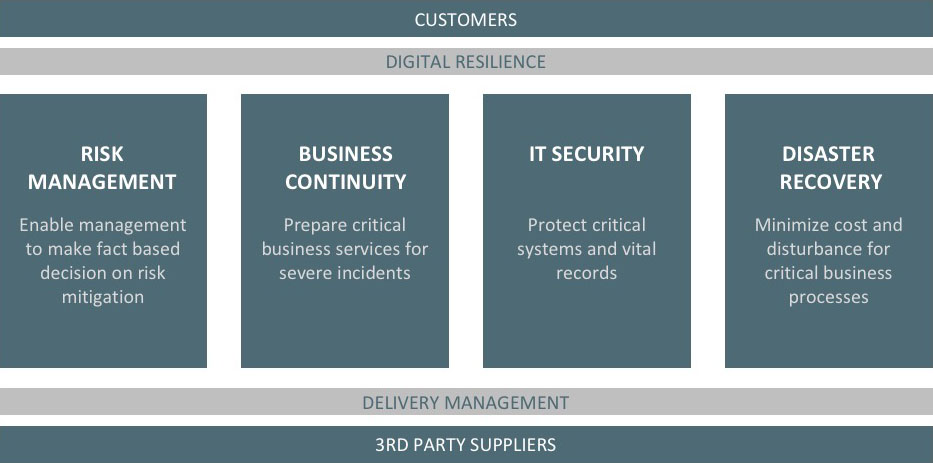Digital Resilience
Your business will be prepared for managing severe incidents, once Digital Resilience is a part of your company strategy.
Risk Management
Given a fast and ever changing industry there is a need to continuously assess risk exposure of your company. By a proactive and holistic view to risk management you will be better of making required investments to protect you companies most critical business functions. Properly managed the assessment will be made in close co-operation with business owners to allow them make fact based decisions on risk acceptance or making the needed investments to support risk mitigation plans.
Business Continuity
Vital business functions and services needs to continuously be assessed for ensuring they are robust to accommodate external and internal threats. By assessing the processes and the IT components needed to keep them up and running vital information will be gained on system dependencies as well as criticality. The systems will be prioritized according to impact on the business should they fail which is a vital input for planning of restore and recovery. For keeping the records updated and relevant it needs to be a recurring exercise part of business strategy and risk management. ITIL aligned services delivery organization are leveraging the IT Service Continuity process for managing severe incidents.
IT Security
Proactive safeguarding of systems and vital records is key for all companies and organisations to avoid the risk of being exposed to loss of business critical data. The complexity is ever increasing driven by critical business processes integrated with external parties as well as IT service delivery networks. Increasing complexity in IT service delivery networks requires thorough authorization, validation and encryption of certificates and communication. Improvement efforts needs to be coordinated between processes, people and technologies. Leading companies are coordinating their improvements in all these dimensions.
Disaster Recovery
The ability to quickly respond to and act on severe incidents is key for minimizing impact on your clients as well as cost of an outage. Companies that are well prepared have defined criterias for assessing the incident, call-lists for mobilizing crisis management teams and plans for restore and recover their services. The disaster recovery plan needs to be tested and updated to keep current and useable in an emergency situation. Given extension of service delivery networks by implementing cloud and outsourcing delivery models it is key to involve external partners in your recovery testing exercise.

